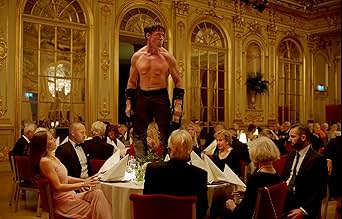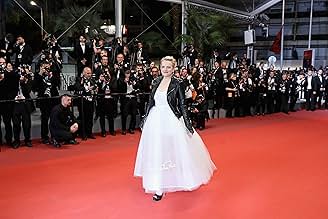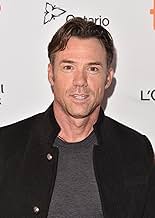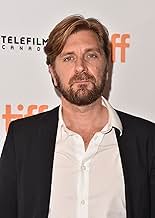Un prestigioso director de arte del museo de Estocolmo vive tiempos de crisis tanto en el área profesional como en el personal cuando intenta organizar una nueva y controvertida exposición.Un prestigioso director de arte del museo de Estocolmo vive tiempos de crisis tanto en el área profesional como en el personal cuando intenta organizar una nueva y controvertida exposición.Un prestigioso director de arte del museo de Estocolmo vive tiempos de crisis tanto en el área profesional como en el personal cuando intenta organizar una nueva y controvertida exposición.
- Nominado para 1 premio Óscar
- 33 premios y 46 nominaciones en total
Reseñas destacadas
A clever, and insightful, but somewhat meandering, social satire that, in hindsight, feels more like a series of vignettes loosely connected by the films protagonist, a well-known museum curator. The satirical sections that focus on the Modern Art world are dead on, although with, perhaps too much restraint. For the most part they are so understated you might find yourself wondering if the filmmakers were intentionally being satiric; except for, obviously, the film's high-point "Welcome to the Jungle" - both its most humorous and chilling sequence - which literally has a punchline at the end. It could easily be argued the film is worth watching for this section alone. Primarily concerned with how individuals interact with society and the world around them, scenes often play out with the camera focused on one character's reaction as opposed to the action, or conversation, occurring off-screen. This can be a disorienting choice, and, at times, confusing, yet undoubtedly all that is intentional. But be warned, the film will make no attempt to tie up all its lose ends: some characters just drop out of sight, storylines are left dangling and the movie just comes to a stop as opposed to having a real climax. You can be left feeling poked and prodded by the film for having watched it, as opposed to rewarded. But, hey, it's Art.
Director Ruben Ostland has followed up his 2014 Golden Globe nominee Force Majeure with Cannes Palme d'Or winner The Square. The film is both a satire of the cultural elite of Stockholm and a sad commentary about the separation between individuals both within circles and between circles. The lead character, Christian (Claes Bang), is the curator of a museum of modern art that seeks to draw attention and donors through avant-garde exhibits and over-the-edge social media campaigns. The film follows Christian through a few weeks of his life when one of the hot new exhibits is "The Square", an actual square in the museum courtyard that is meant to be "a sanctuary of trust and caring." But rather than show trust and caring, the movie The Square raises a number of troubling questions: How thin is the veneer of civilization? Can political correctness substitute for empathy? Is art whatever a curator chooses to put in an art museum? And enveloping these questions is the separation of the circle of Stockholm's cultural elites from the City's homeless and immigrant population, as well as the separation of individuals within the City's cultural elite. One set piece in particular portrays the inability of the Stockholm's elite to communicate on a human level: It is Christian's meeting with Anne (Elisabeth Moss), a publicist, the day after a night of sex—and a bizarre argument over what to do with a used condom. In this scene Christian is totally unable to say the needed words about what had happened between them. (Anne, an American, comes across as much more able to relate to others than any of the Swedes in the movie.) Another memorable scene is the one in which a banquet for museum donors is interrupted when the performer (Terry Notary), playing an ape, goes out of control. The diners, who are initially frozen by their need for decorum, or perhaps by their need to display political correctness, ultimately go ape themselves. Perhaps not a total surprise since the same donor diners had earlier stampeded their way to a luncheon in a lighter scene. There are many sub-plots in the film—some satirizing interactions within Stockholm's upper class, others between classes— perhaps leaving some viewers displeased by the way the film jumps without warning from one set piece to another. Others may dislike long stretches of art-film inactivity in many of the episodes—something that explains why the movie lasts for 2 hours and 22 minutes. Nevertheless, The Square does capture the alienation of modern society, and does it with plenty of dark humor.
You have to be astonished that this one collected a Palme. Not least, it evidently lies in the shadow of Haneke, winner of two recent Palmes for much better movies.
The satire on the art world, the rattling of the bourgeoisie, both seem too overdrawn to be effective. Sketches go on too long, as when the museum director videos his apology, or the ape-man detonates the society party. Cutaways that don't happen, or do but are merely irritating, seem like unsuccessful adaptions of Haneke's grating style.
A few folks left my screening up around the 90 minute mark, their patience evidently worn thin. They'd seen the best of it, like the director's fling with the journo.
Now, if you really want to see someone stick it right up the bourgeoisie, you can't go past Haneke's mordant misbehaviour in Benny's Video (1992).
The satire on the art world, the rattling of the bourgeoisie, both seem too overdrawn to be effective. Sketches go on too long, as when the museum director videos his apology, or the ape-man detonates the society party. Cutaways that don't happen, or do but are merely irritating, seem like unsuccessful adaptions of Haneke's grating style.
A few folks left my screening up around the 90 minute mark, their patience evidently worn thin. They'd seen the best of it, like the director's fling with the journo.
Now, if you really want to see someone stick it right up the bourgeoisie, you can't go past Haneke's mordant misbehaviour in Benny's Video (1992).
American reporter Anne (Elisabeth Moss) interviews Christian (Claes Bang), the curator of an avantgarde modern art museum in Stockholm. His phone and his wallet get stolen by a crew of pickpockets. His assistant Michael helps track the phone and suggests sending threatening letters to all the apartments within the phone's location. Christian does it and faces unexpected consequences.
The scheme is actually quite clever and it works in the movie. Christian is very frustrating in the politically correct way. He is off-putting but that's the point. He could easily fix the problem with the kid but he's too scared of him. It would be more understandable if the kid is a teenager. It's silly and shows his lack of a backbone. There are a couple of amazing scenes and there are quite a few filler scenes in two and a half hours. It definitely could be cut down to two hours. The Tourette's scene is fun. Moss has a couple of great scenes and she's the best actor in the movie. This is not a movie to root for the guy but also not to root against him. It's not really a comedy or that intense as a drama. It's a movie of frustration at all of his fallibilities. It is great at painting a picture of a man trying to be good but lacks the courage to be truly good when backed into a corner.
The scheme is actually quite clever and it works in the movie. Christian is very frustrating in the politically correct way. He is off-putting but that's the point. He could easily fix the problem with the kid but he's too scared of him. It would be more understandable if the kid is a teenager. It's silly and shows his lack of a backbone. There are a couple of amazing scenes and there are quite a few filler scenes in two and a half hours. It definitely could be cut down to two hours. The Tourette's scene is fun. Moss has a couple of great scenes and she's the best actor in the movie. This is not a movie to root for the guy but also not to root against him. It's not really a comedy or that intense as a drama. It's a movie of frustration at all of his fallibilities. It is great at painting a picture of a man trying to be good but lacks the courage to be truly good when backed into a corner.
2017's Palme d'or winner, Swedish absurdist Ruben Östlund's social satire taps into the life of Christian (Bang), the curator of an art museum in Stockholm, which will descend into a tailspin after his wallet and smartphone is stolen en route to work one day by a confidence trick.
A significant step-up from his uppity marital disintegration inspection FORCE MAJEURE (2014), In THE SQUARE, Östlund has learned how to let his hair down with more brio and conceal moral condescendence among his sarcastic skits, which makes for a piquant contemporary comedy doesn't flinch from touching many a raw nerve among audience, anyway, the joke is on all of us because there are something undeniably unsavory residing within every and each human soul, we can laugh about it, but more often than not, a twinge of self-awareness synchronously pulsates.
"The Square is a sanctuary of trust and caring. Within it we all share equal rights and obligations." it is a motto from the museum's latest exhibition, whose titular installation supersedes an august bronze statue in the opening (with droll maladroitness setting the keynote of the film), but can its underlying altruism transcend from artistic cant into something concrete in reality? Christian's story will give us a wry answer.
A seemingly harmless plan (although Christian must deign to actualize it) to retrieve his stolen phone actually works, but before Christian's euphoria subsides, it boomerangs. It only takes a sincere apologize and some explanation to mend the fences, which eventually deteriorates into uncanny paranoia and insidious physical affliction towards a minor is implied, in-congruent with the rest of the film's farcical tenor, but it tests the boundary of how far THE SQUARE is willing to push the buttons, and Östlund shows judicious concerns about what is shown on the screen in slightly gnawing execution, and no easy recompense is dished up in the end.
Elsewhere, jokes are in full swing, starting from the opening interview of Christian from an American journalist Anne (Moss) about the gobbledygook on the museum's internet, to a faux pas caused by a Tourette's syndrome patient, and the ludicrous tug-of-war in Anne and Christian's one-night-stand, apparently with a chimpanzee in the next room, until the dreadful irony in our click-bait media publicity with controversial, eyeball-grabbing gimmick, and a painful realization that it often works. However, the central piece, of course belongs to the hyped (which is on the film's main poster) performance art of an ape-man radically terrorizing the entire guests of a banquet to a bitter end, motion-capture stuntman Terry Notary totally owns the one-off opportunity in the central stage to redefine primate mimicking and debunk how similarly animalistic we are underneath all the finery exterior, notwithstanding the whole act partakes of a well- orchestrated trick for the sake of scandalization.
A late-bloomer Claes Bang is perfectly apt in inhabiting Christian's towering figure, dapper mien and jaunty disposition, oozing disarming charisma which veils his self-seeking nature to a degree we even tend to give excuses to him involuntarily (that boy is tenacious and annoying, how on earth his staff could upload that inappropriate video onto their public website without his imprimatur?), and in the gender politics spar with a gutsy Elisabeth Moss (although her part is shamefully peripheral, and her defense of "it takes two to tango" accusation is too feeble to register), which fortuitously hits the hot-button with the current power-abuse cleansing pandemic.
Forsaking a traditional score in favor of a cappella passages to heave the story's emotional shift, THE SQUARE is a sharp-tongued, rapier-like caricature aiming at a society characterized by class- discrepancy (beggars galore in one of the richest country in the world is a disheartening antimony), patriarchy and apathy, redolent of a visceral tang of self-reflexive mockery with a knowing wink, that is the power of THE SQUARE.
A significant step-up from his uppity marital disintegration inspection FORCE MAJEURE (2014), In THE SQUARE, Östlund has learned how to let his hair down with more brio and conceal moral condescendence among his sarcastic skits, which makes for a piquant contemporary comedy doesn't flinch from touching many a raw nerve among audience, anyway, the joke is on all of us because there are something undeniably unsavory residing within every and each human soul, we can laugh about it, but more often than not, a twinge of self-awareness synchronously pulsates.
"The Square is a sanctuary of trust and caring. Within it we all share equal rights and obligations." it is a motto from the museum's latest exhibition, whose titular installation supersedes an august bronze statue in the opening (with droll maladroitness setting the keynote of the film), but can its underlying altruism transcend from artistic cant into something concrete in reality? Christian's story will give us a wry answer.
A seemingly harmless plan (although Christian must deign to actualize it) to retrieve his stolen phone actually works, but before Christian's euphoria subsides, it boomerangs. It only takes a sincere apologize and some explanation to mend the fences, which eventually deteriorates into uncanny paranoia and insidious physical affliction towards a minor is implied, in-congruent with the rest of the film's farcical tenor, but it tests the boundary of how far THE SQUARE is willing to push the buttons, and Östlund shows judicious concerns about what is shown on the screen in slightly gnawing execution, and no easy recompense is dished up in the end.
Elsewhere, jokes are in full swing, starting from the opening interview of Christian from an American journalist Anne (Moss) about the gobbledygook on the museum's internet, to a faux pas caused by a Tourette's syndrome patient, and the ludicrous tug-of-war in Anne and Christian's one-night-stand, apparently with a chimpanzee in the next room, until the dreadful irony in our click-bait media publicity with controversial, eyeball-grabbing gimmick, and a painful realization that it often works. However, the central piece, of course belongs to the hyped (which is on the film's main poster) performance art of an ape-man radically terrorizing the entire guests of a banquet to a bitter end, motion-capture stuntman Terry Notary totally owns the one-off opportunity in the central stage to redefine primate mimicking and debunk how similarly animalistic we are underneath all the finery exterior, notwithstanding the whole act partakes of a well- orchestrated trick for the sake of scandalization.
A late-bloomer Claes Bang is perfectly apt in inhabiting Christian's towering figure, dapper mien and jaunty disposition, oozing disarming charisma which veils his self-seeking nature to a degree we even tend to give excuses to him involuntarily (that boy is tenacious and annoying, how on earth his staff could upload that inappropriate video onto their public website without his imprimatur?), and in the gender politics spar with a gutsy Elisabeth Moss (although her part is shamefully peripheral, and her defense of "it takes two to tango" accusation is too feeble to register), which fortuitously hits the hot-button with the current power-abuse cleansing pandemic.
Forsaking a traditional score in favor of a cappella passages to heave the story's emotional shift, THE SQUARE is a sharp-tongued, rapier-like caricature aiming at a society characterized by class- discrepancy (beggars galore in one of the richest country in the world is a disheartening antimony), patriarchy and apathy, redolent of a visceral tang of self-reflexive mockery with a knowing wink, that is the power of THE SQUARE.
¿Sabías que...?
- CuriosidadesThe crowd Oleg was taunting in the dinner scene, throwing water over and pushing around, were in fact drawn from the actual ranks of Sweden's 1 percent, including some of the country's wealthiest art patrons ("They were so into it," Terry Notary said).
- PifiasIn the closing titles of "The Girl With A Kitten" clip, the Hebrew version is wrong: the English noun "square" appears in Hebrew as "an open space in a city" rather than "rectangle with all sides equal").
- ConexionesFeatured in The 75th Annual Golden Globe Awards (2018)
- Banda sonoraNo Good (Extended Mix)
Performed by Fedde Le Grand, Ossama Al Sarraf and Ned Shepard (as Sultan + Shepard)
Written by Ossama Al Sarraf, James Bratton, Kelly Charles, Robin Morssink, Fedde Le Grand and Ned Shepard
Selecciones populares
Inicia sesión para calificar y añadir a tu lista para recibir recomendaciones personalizadas
- How long is The Square?Con tecnología de Alexa
Detalles
- Fecha de lanzamiento
- Países de origen
- Sitios oficiales
- Idiomas
- Títulos en diferentes países
- The Square. La farsa del arte
- Localizaciones del rodaje
- Empresas productoras
- Ver más compañías en los créditos en IMDbPro
Taquilla
- Recaudación en Estados Unidos y Canadá
- 1.502.347 US$
- Fin de semana de estreno en EE. UU. y Canadá
- 74.233 US$
- 29 oct 2017
- Recaudación en todo el mundo
- 8.588.030 US$
- Duración2 horas 31 minutos
- Color
- Mezcla de sonido
- Relación de aspecto
- 1.85 : 1
Contribuir a esta página
Sugerir un cambio o añadir el contenido que falta

Principal laguna de datos
What is the streaming release date of The Square (2017) in Australia?
Responde






























